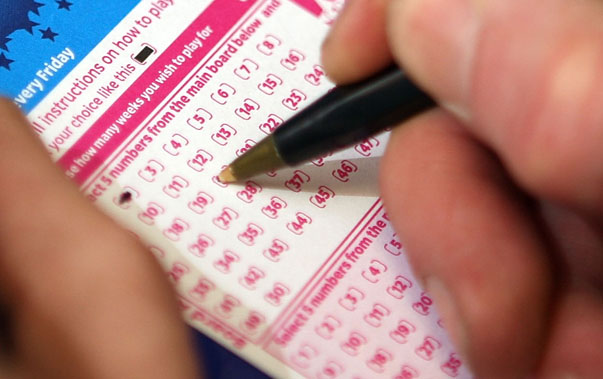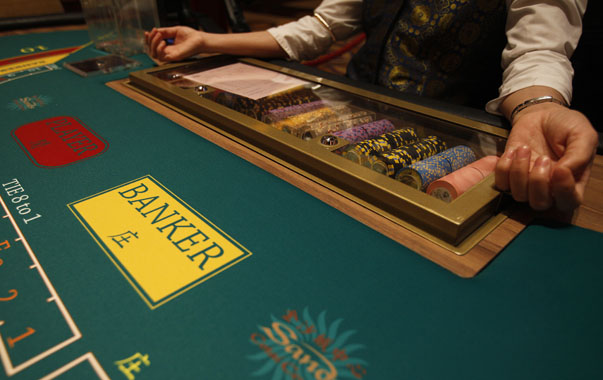The claim
 “New Lotto gives you more ways to win more money.”
“New Lotto gives you more ways to win more money.”
National Lottery press release, 3 October 2013
The background
Punters have steadily been losing interest in the National Lottery’s main Lotto draw since the mid-90s, with ticket sales plummeting and the value of prize money dwindling steadily in real terms.
The result is less money for good causes from the big Saturday and Wednesday night draws. Operator Camelot has done some market research and relaunched Lotto with a different prize structure.
But the biggest headline-grabbing change is the doubling of the entry price from £1 to £2. Does the price hike mean the punter is getting ripped off? FactCheck finds out.
The analysis
The basic game hasn’t changed. You still pick six numbers from 49, so the probabilities haven’t changed. The chance of scooping the jackpot remains the same at an astronomical one in 14 million.
To put this in perspective, your chances of being struck by lightning in the UK in any given year are around a million to one.
The overall chance of winning a prize of any size in the Lotto is still 54 to one.
This explains why no serious gambler would consider playing the lottery to try to make money: you have a much better chance of winning in almost every other form of gambling.
It could be argued that the lottery offers poor odds but a bigger jackpot than most other games can pay out. But that doesn’t really stand up.
Prizes in sports and horse race betting can run into the millions and offer much better odds. We asked a couple of real bookies to crunch the numbers for us and they were only too pleased to help.
William Hill worked out what would happen if you spent your £2 lottery stake on a long-shot bet on the football this weekend instead.
Let’s say you back all the favourites in this weekend’s Premier League and Championship matches with an accumulator bet. That means that if you win on the first bet, your total winnings go on the second bet in the sequence, and so on, with both potential winnings and odds going up exponentially.
Multiply the odds from all 22 matches and your likelihood of winning is more than 2 million to one. You would get a theoretical payout of £4.6m if you picked all 22 winners.
William Hill actually caps its real payouts for football at £2m – but that’s about the same amount paid out this week in the last jackpot under the old Lotto regime. So your odds of winning £2m on the Lotto were about six times worse than those offered by a typical high street bookie.
And remember that you could end up with a smaller prize if lots of people win the jackpot in the same week as you, as the winnings are shared. That’s something that won’t happen with a bet made at a bookie’s.
The prize pool
Another way of looking at value for money is to consider how much of the money spent in bets is returned to winners in the form of prize money. What percentage of your stake are you likely to win back?
This is a key question for serious gamblers, and the percentage of the money spent scooped up by the “house” is something all casino players consider.
Again, the lottery offers a much worse deal than almost every other popular form of gambling.
Play poker in a casino and the house will take a “rake”. It will skim off a small amount from money bet on each hand – perhaps 5 per cent.
That means 95 per cent of the money the players wager goes back into the prize fund. By contrast Lotto scoops up a much bigger percentage than any casino or poker room would dare to take, and has historically paid just 45 per cent of its takings into the prize pool.
Until last week 45 per cent of ticket sales went into prizes, 33 per cent goes to good causes, and the rest is divided up between the government, the shops that sell the tickets, and Camelot.
What went unreported today is the fact that Camelot have changed the percentages for the new lotto. There’s more money up for grabs for punters now and less for good causes.
The operator told us:
“The proportion of revenue which goes to the prize fund on new Lotto will increase from 45 per cent to 47.5 per cent. This 2.5 per cent increase will come from a very small reduction (2.35 per cent) in the overall percentage allocation to good causes and a very small reduction (0.15 per cent) in the overall percentage allocation to Camelot in profit.”
Camelot seem slightly reluctant to divulge this, presumably fearing negative publicity from the slightly reduced support for the various projects the lottery supports.
But it’s really a matter of opinion. If you are more worried about winning than being public-spirited, you will feel you are getting a slightly better deal.
Dr John Haigh, a probability specialist from the University of Sussex, told us: “Punters will be getting more of their entry money back, at the expense of Good Causes.”
He pointed out that new prize structure favours the majority of winning players, since the vast majority of people who win anything match three numbers and get the minimum prize. About 800,000 tickets win every week by matching three or four numbers. Only 800 tickets win at the higher levels.
If you get three numbers right you now win £25 with a £2 stake instead of £10 from a £1 punt.
So we can say that most people who win will win more for their stake as a result of changes to the prize structure.
Dr Haigh said: “Nearly all the prizes are match-three. It’s probably good psychology for Camelot to more than double the match-three prize.”
The verdict
The new revamped Lotto offers winners slightly better value for money, and more winners are likely to win more for their stake.
The flip side is that a smaller portion of the total takings from ticket sales will go to good causes, but of course if the new strategy pays off with more sales, the overall value of the contribution could go up.
The £5m question for Camelot is whether doubling the price will mean regular players abandon the Lotto in such numbers that the operation starts to lose money.
The company says it accepts that some people will be put off by the higher ticket price, but says it isn’t making any forecasts about the impact on total sales revenue.
A big decline in sales would affect all our assumptions about value, since the size of the bigger prize payouts depend on the total number of tickets sold.
That may be one more reason to avoid the lottery if you like a flutter and are seeking the best value for money. But then if you are a discerning gambler you will no doubt already know that you are better off taking your chances at the blackjack table or roulette wheel than in the corner shop anyway.
Not that FactCheck would ever condone gambling of any kind.
Be lucky.
By Patrick Worrall







